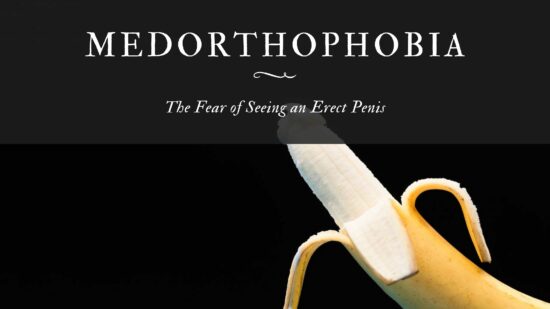Medorthophobia is often seen as a synonym for phallophobia, but that is not what it is. Medorthophobia is defined as the fear of seeing an erect penis or objects depicting an erect penis and is the narrower sense of Phallophobia which means the aversion of masculinity in its broader terms.
Medorthophobia derived from two Greek words “Orthios” and “Phobos” which means “Erect” and “Fear or aversion” respectively. This term is somewhat specific to the fear of seeing an erect penis.
The term “Ithyphallophobia” is related to the term “medorthophobia” and it means the fear of seeing, thinking, touching or having an erect penis.
However, the term “Medomalacophobia” or “Medomalacuphobia”, also related to medorthophobia, is fear of losing an erection or having erectile dysfunction.
This fears can affect both men and women, but women are mostly affected. A person with this condition has irrational fear towards the sight of an erect penis, whether it is covered by a piece of clothing or is left bare.
They are also terrified of touching an erect penis. They acknowledge that the fear they feel is irrational, but they cannot help it.
Table of Contents
Causes of Medorthophobia
The causes of Medorthophobia is specific to the individual; thus, it varies across persons. To some people, it is as a result of a traumatic experience, maybe a background upbringing, culture and religion about the individual or genetics and so on.
Somehow, this is also the causes of some other types of phobias.
Many reasons can trigger methordophobia in sufferers, but the most common and outstanding ones are as follows:
Culture and religion
This has the most substantial influence on most people. Culture and religion are known to influence how people think and what they believe, and sometimes to a fault.
Most culture and religion have sexual intercourse seen as sacred and premarital sexual intercourse as evil due to the belief that sexual intercourse should be practised only between married couples.
Thus, the various texts in religion and culture that use shame and fear to make sure that people stay away from engaging in unacceptable sexual behaviours but this can adversely affect some of these people and will make them develop Medorthophobia.
Background Upbringing
Persons raised by caregivers or parents that are irrationally afraid of a specific object or sufferers of Medorthophobia are most likely to have fear and anxiety transferred to them.
This may develop into phobias, and Some of them become unfortunate sufferers of Medorthophobia.
Trauma
Unpleasant past experiences that are traumatic to an individual may cause the person to develop a phobia towards any object or thoughts about the traumatic experience.
In this case, rape or any other sexual violence is a typical example; A woman raped by a man in the past may find it difficult to enjoy sexual pleasure without being triggered from the traumatic experience.
This may cause them to feel anxious and stressed most times. This anxiety may then develop into Medorthophobia, which is fear directed at an erect penis.
Sometimes, this may be as a result of persons relaying their unpleasant traumatic experiences (which may have a connection with erect penises) to you which in turn may cause you to develop medorthophobia.
Genetics and hereditary
Traits are passed down to the offsprings; unfortunately, medical conditions can be passed down as well. Phobias specifically medorthophobia can be passed down to offsprings, and have them to start suffering unexplainably from Medorthophobia.
Stress
Stress is a factor that promotes and increases anxiety in an individual. When you start getting all stressed out, and you fail to deal with it, you are more likely to have your anxiety to develop into a particular phobia medorthophobia inclusive.
Symptoms
The symptoms that a person with medorthophobia manifest depends on the severity of the condition.
The symptoms of this condition may vary across persons depending on how much fear they feel directed at an erect penis. There are physical and behavioural symptoms that a person with Medorthophobia experience.
Physical Symptoms Of Medorthophobia
Persons living with this condition most times experience panic attacks. This can be very scary and often distressing for the phobic.
However, these symptoms manifested often occur immediately and without any forewarning signs.
These panic attacks characterised with overwhelming feelings can result in actual probable physical signs and symptoms, which includes:
- Sweating
- Trembling
- Heart rate palpitations
- Hot flushes or chills
- Difficulty breathing
- Choking sensation
- Rapid heartbeat
- Stomach upset
- Nausea
- Headaches and dizziness
- Faint feelings
- Numbness
- Dry mouth
- Ringing or buzzing sounds in ears
- Confusion
- Hyperventilation
- Severe chest pain
- Increased blood pressure
Behavioural Symptoms Of Medorthophobia
Many severe cases of Medorthophobia may result in panic attacks.
When a person with Medorthophobia is exposed to an erect penis or any object that depicts it, the person may experience the following behavioural symptoms:
- Fear of losing control
- Fear of fainting
- Feelings of dread
- Fear of death
- Fear of harm or illness
- Guilt
- Shame
- Withdrawing from socialising with people
- Feeling sad
- Feeling of hopeless
- Feeling disconnected
- Confusion
- Anger, irritability, and mood swings
- Anxiety and fear
- Depression
These symptoms suggest that you may have Medorthophobia. However, if the answer to the following questions is yes, then you have Medorthophobia.
- Whenever the thought of an erect penis comes to your mind, do you feel woozy?
- Does your mouth instantly get dry and your palms moist?
- Do you feel your heart rate palpitate?
- Do you feel so weak like you are unable to stand to your feet?
Treatment of Medorthophobia
Medorthophobia can be very distressing and unpleasant to the individual and should not be taken lightly. Most times, this condition can get in your way of going about your normal day-to-day activities.
Treatment of medorthophobia can help relieve the symptoms and help you to recover subsequently.
This includes:
Self-care
One of the most vital parts of treating any type of phobia is self-care. Self-care is an umbrella term consisting of how you take care of yourself.
Selfcare involves the following:
Relaxation
Being relaxed helps you to feel in control of yourself, your thoughts and your actions. When when you are resting, you feel safe and relatively happy. This helps in the prevention of anxiety; thus reducing your chances of having panic attacks.
Exercises
Exercising is a right way of taking in deep breaths, sweating out waste products and staying fit. This can help you get your mind away from triggers of Medorthophobia.
Stress management
Stress prevention and management, can help in managing anxiety and preventing phobias, particularly Medorthophobia.
Engaging in exercises, meditations and adequate relaxation can help you and identify negative thoughts, manage stress and avoid panic attacks.
This will help you build up your self-confidence and improve your self-esteem, which makes you less likely to be stressed and developing this disorder.
Psychotherapy
This is an essential part of treating phobias, particularly Medorthophobia. Persons with this condition should speak with a person that they find trustworthy; either a friend or a therapist.
You can join online or offline support groups. This can make you feel a kind of connection because the people you in the group have the same issues that you have and this will help you overcome this condition.
Cognitive behaviour therapy (CBT)
This method is used in the treatment of severe cases of Medorthophobia. This treatment works by the cooperative work between you and your therapist. Your therapist will help you influence your mind to change from a negative mindset to positive ones.
Under this, you can get treated with exposure therapy whereby you are gradually being exposed to pictures, videos, and actual real penises to make you feel less threatened by each encounter.
This is done only under professional and careful supervision to prevent panic attacks at the sight of an erect penis.
Hypnotherapy
Some severe and critical cases of Medorthophobia can be challenging to solve, but hypnotherapy has been proven to be highly potent in the treatment of phobias, especially Medorthophobia.
Hypnotherapy works opening the subconscious mind of the patient to reprogram it not to get triggered at the sight or thought of erect penises.
Medication
Tranquilisers or antidepressants are medications that can be used to treat Medorthophobia. Unfortunately, these medications have significant side effects which may have adversely affect your usual day-to-day lifestyle.
Therefore, they are not prescribed to be used long-term.






